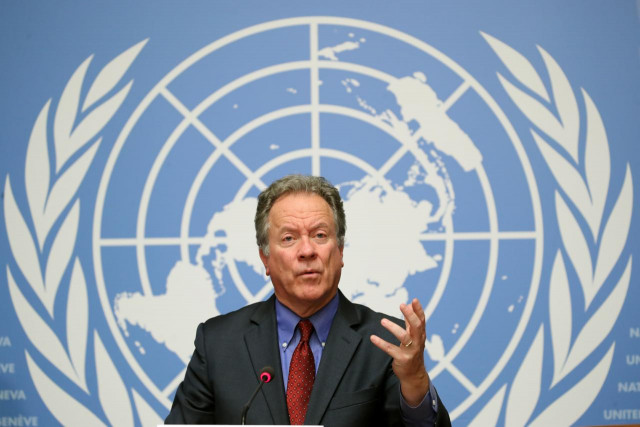Yemen food aid being stolen in Houthi-run areas: UN WFP
War, ensuing economic collapse has left 15.9 million people facing severe acute food insecurity

The World Food Programme (WFP) Executive director David Beasley attends a news conference on the food security in Yemen at the United Nations in Geneva, Switzerland, December 4, 2018. PHOTO: REUTERS
The Houthis control most towns and cities, including the capital Sanaa, from where they ousted Abd-Rabbu Mansour Hadi's government in 2014. A Saudi-led coalition intervened against the Houthis in 2015 with the aim of restoring his government.
Yemen rebels begin withdrawal from Hodeida port: UN
After hearing that humanitarian food was being sold on the open market in Sanaa, WFP said it found many people had not received the food rations to which they are entitled, and that at least one local partner organisation affiliated with the Houthi Ministry of Education was committing fraud.
"This conduct amounts to the stealing of food from the mouths of hungry people," WFP Executive Director David Beasley said. "At a time when children are dying in Yemen because they haven't enough food to eat, that is an outrage. This criminal behaviour must stop immediately."
A Houthi official expressed "deep disappointment" with the statement, saying it was "not in line with WFP practices."
"We are surprised by this position, which is not backed by evidence and proof... We welcome the formation of independent committees to investigate the violations," said Mohammed Ali al-Houthi, the head of the Houthis' Supreme Revolutionary Committee, in a statement sent to Reuters. Yemen's war and the ensuing economic collapse have left 15.9 million people, 53 per cent of the population, facing "severe acute food insecurity" and famine was a danger if immediate action was not taken, a survey said this month.
Gravely ill boy whose mother had to fight to visit from Yemen dies
WFP is trying to get food aid to as many as 12 million severely hungry people. It said its monitors had gathered photographic and other evidence of trucks illicitly removing food from designated food distribution centres and local officials falsifying records and manipulating the selection of beneficiaries.
"It was discovered that some food relief is being given to people not entitled to it and some is being sold for gain in the markets of the capital," the WFP statement said.
Beasley said he was asking the Houthi authorities to stop food being diverted and make sure it reaches the people who need it.
Herve Verhoosel, WFP spokesman in Geneva, said WFP was looking at the possibility of distributing cash to needy people, if a biometric identification system could be introduced, using personal data including iris scans and finger prints.
He said Beasley had written to the Houthi leadership about the WFP findings several days ago.



















COMMENTS
Comments are moderated and generally will be posted if they are on-topic and not abusive.
For more information, please see our Comments FAQ